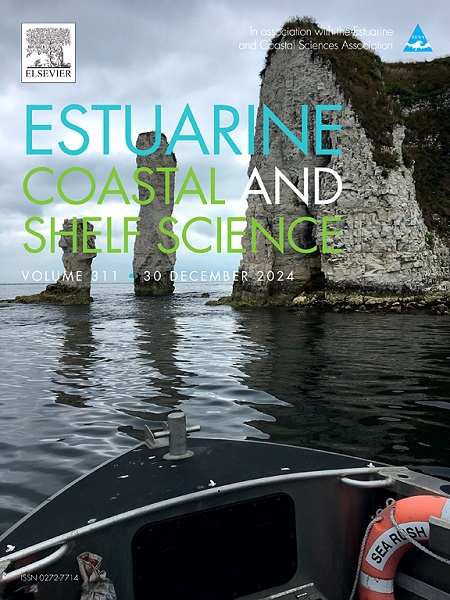通过耳石微化学揭示澳大利亚东部河流中一种箭鱼科鱼类一生中的活动变化
IF 2.6
3区 地球科学
Q1 MARINE & FRESHWATER BIOLOGY
引用次数: 0
摘要
鲶鱼又称海鲇,栖息于海洋、河口,偶尔也栖息于淡水生境。它们通常在当地资源丰富,在个体渔业和商业渔业中非常重要,尤其是在发展中国家。关于该科许多属的生态学和栖息地偏好的详细信息尚缺。我们分析了从澳大利亚新南威尔士州克拉伦斯河下游采集的 57 条蓝鲶(Neoarius graeffei)的耳石,目的是更好地了解该物种的运动生态,包括其应对环境变化的能力。利用激光烧蚀电感耦合等离子体质谱法(LA-ICP-MS)对耳石中的Sr:Ca、Ba:Ca和87Sr:86Sr比率进行量化,并推断其一生的移动模式。耳石微化学分析揭示了 N. graeffei 运动模式的个体间差异。大多数个体对河口水域的亲和力很强,但也有一些个体长期在上游淡水生境中活动。通过Ba:Ca、Sr:Ca和87Sr:86Sr耳石剖面图的变化可确定其运动模式的变化,但Sr:Ca缺乏明确的模式。此外,Ba:Ca 和 87Sr:86Sr 耳石横断面均显示幼体在河口居住,以及一些个体在一生中多次在化学性质不同的区域之间移动。在我们的研究中,耳石微化学研究有助于阐明 N. graeffei 的长期运动模式。揭示单一物种的多变运动模式,可以发现鮨科其他物种的潜在适应性,并表明鮨鱼对环境变化和人为影响具有很强的适应能力。本文章由计算机程序翻译,如有差异,请以英文原文为准。
Variation in lifetime movements of an Ariidae species in an eastern Australian river revealed by otolith microchemistry
Ariids, or sea catfishes, inhabit marine, estuarine, and occasionally freshwater habitats circumtropically. They are most often locally abundant and are important in artisanal and commercial fisheries, particularly in developing countries. Detailed information on the ecology and habitat preferences of many of the genera within the family is lacking. We analysed the otolith of 57 blue catfish, Neoarius graeffei, collected from the lower reaches of the Clarence River, NSW, Australia with the aim of better understanding the species movement ecology, including its ability to respond to environmental change. Laser Ablation Inductively Coupled Plasma Mass Spectrometry (LA-ICP-MS) was used to quantify Sr:Ca, Ba:Ca and 87Sr:86Sr ratios in otoliths and infer lifetime movement patterns. Otolith microchemistry revealed inter-individual variation in the movement patterns of N. graeffei. A strong affinity for estuarine waters was evident among most individuals, with movement into upstream freshwater habitats for extended periods discernible in some individuals. Variation in movement patterns was identified by changes in Ba:Ca, Sr:Ca and 87Sr:86Sr otolith profiles, although Sr:Ca lacked clear patterns. Furthermore, both Ba:Ca and 87Sr:86Sr otolith transects revealed estuarine residence by juveniles, as well as multiple movements among chemically distinct areas throughout the lifetime of some individuals. Otolith microchemistry enabled elucidation of long-term movement patterns of N. graeffei in our study. Uncovering the variable movement patterns of a single species identifies the potential adaptable nature of other species within the Ariidae family and indicates N. graeffei is resilient to environmental changes and anthropogenic impacts.
求助全文
通过发布文献求助,成功后即可免费获取论文全文。
去求助
来源期刊
CiteScore
5.60
自引率
7.10%
发文量
374
审稿时长
9 months
期刊介绍:
Estuarine, Coastal and Shelf Science is an international multidisciplinary journal devoted to the analysis of saline water phenomena ranging from the outer edge of the continental shelf to the upper limits of the tidal zone. The journal provides a unique forum, unifying the multidisciplinary approaches to the study of the oceanography of estuaries, coastal zones, and continental shelf seas. It features original research papers, review papers and short communications treating such disciplines as zoology, botany, geology, sedimentology, physical oceanography.

 求助内容:
求助内容: 应助结果提醒方式:
应助结果提醒方式:


